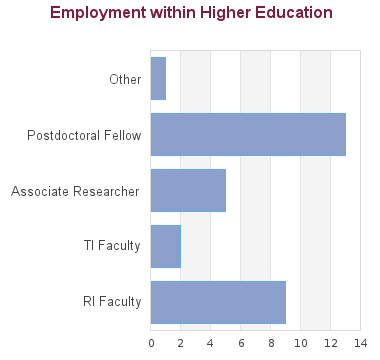
Ryan Yuen
Job Title
Scientist
Employer
The Hospital for Sick Children

Review details about the recently announced changes to study and work permits that apply to master’s and doctoral degree students. Read more
The UBC Department of Medical Genetics is an inspiring and productive community of scholars of genetics and genomics. It is an outstanding provider of knowledge, technical expertise, and compassionate care for our patients. Faculty members in the Department of Medical Genetics are at the forefront of their fields using cutting edge genetic, epigenetic, genomic, and bioinformatic methodologies to gain insight into diseases such as cancer, diabetes, obesity, neurodegenerative and neurological disorders, and other genetic diseases. Research is highly interactive and often involves local, national, and international collaborations which further enrich the research experience.
Individual labs conduct clinical and/or translational research and basic experimental research engaging a wide variety of approaches including the use of model organisms such as mice, flies (D. melanogaster), worms (C. elegans), and yeast (S. cerevisiae).
The Mission of the UBC Department of Medical Genetics is to pursue basic and clinical research for diagnosis, prevention, and treatment of genetic disease. Our goal is to be a world leader in the research, clinical practice, and teaching of Genetic Medicine. The Department is a respected source of information and advice to society. While focusing on key areas of genetic medicine, we view diversity of approach and techniques to be an essential strength of our Department.
Grade Point Average (GPA) – Canadian applicants:
Grade Point Average (GPA) – international degrees:
The Faculty of Graduate and Postdoctoral Studies establishes the minimum admission requirements common to all applicants, usually a minimum overall average in the B+ range (76% at UBC). The graduate program that you are applying to may have additional requirements. Please review the specific requirements for applicants with credentials from institutions in:
Each program may set higher academic minimum requirements. Please review the program website carefully to understand the program requirements. Meeting the minimum requirements does not guarantee admission as it is a competitive process.
Applicants from a university outside Canada in which English is not the primary language of instruction must provide results of an English language proficiency examination as part of their application. Tests must have been taken within the last 24 months at the time of submission of your application.
Minimum requirements for the two most common English language proficiency tests to apply to this program are listed below:
Overall score requirement: 100
Reading
24
Writing
26
Speaking
24
Listening
24
Overall score requirement: 7.5
Reading
7.0
Writing
7.0
Speaking
7.0
Listening
7.0
Property field_prog_lang_test_min
Some programs require additional test scores such as the Graduate Record Examination (GRE) or the Graduate Management Test (GMAT). The requirements for this program are:
The GRE is not required.
MSc degree (focused on life sciences, biotechnology, etc.)
Mandatory advanced-level courses in:
Strongly recommended advanced-level courses in one or more of the following:
Additional criteria:
A complete application includes:
Application form
Letter of interest / intent (1 page)
Curriculum Vitae
References (3)
TOEFL or IELTS test scores – if applicable
Your application will not be reviewed, and therefore be rejected if your OVERALL AND COMPONENT test scores are below the required Medical Genetics minimum scores. There will be no exceptions.
Official post-secondary transcripts; and degree certificates (international students)
Successful applicants meet and often exceed the admissions and pre-requisite requirements:
Deadline to submit online application. No changes can be made to the application after submission.
Transcript DeadlineDeadline to upload scans of official transcripts through the applicant portal in support of a submitted application. Information for accessing the applicant portal will be provided after submitting an online application for admission.
Referee DeadlineDeadline for the referees identified in the application for admission to submit references. See Letters of Reference for more information.
All applicants have to submit transcripts from all past post-secondary study. Document submission requirements depend on whether your institution of study is within Canada or outside of Canada.
A minimum of three references are required for application to graduate programs at UBC. References should be requested from individuals who are prepared to provide a report on your academic ability and qualifications.
Many programs require a statement of interest, sometimes called a "statement of intent", "description of research interests" or something similar.
Students in research-based programs usually require a faculty member to function as their thesis supervisor. Please follow the instructions provided by each program whether applicants should contact faculty members.
SEPTEMBER INTAKE - MSc and PhD Applicants:
JANUARY INTAKE – PhD Applicants Only:
Permanent Residents of Canada must provide a clear photocopy of both sides of the Permanent Resident card.
All applicants must complete an online application form and pay the application fee to be considered for admission to UBC.
See Medical Genetics website for up-to-date articles featuring faculty research.
Research in the Department of Medical Genetics covers the study of human genetics with areas of focus in mammalian development, regulation of gene expression, genetic diseases due to single gene or complex inheritance, birth defects, reproduction, cancer, immunology, genomics, bioinformatics, ethics and population health.
Research Areas of Expertise:
Medical Genetics Rotation Program: MSc and PhD applicants who have applied for the September-start, and who are highest ranked by the Medical Genetics Admissions Committee, will be offered the opportunity to join the Medical Genetics Rotation Program. The four top-ranked applicants are offered positions will also receive one-year Rotation Program Awards. Rotation Program students rotate through three different laboratories before choosing a final, thesis lab. Rotations are for nine-weeks each, from September to March. The Rotation Program is open to Canadians, Permanent Residents of Canada, and international applicants.
Medical Genetics Graduate Program students are encouraged to volunteer their leadership skills and talents to science-related departmental and community events and projects. There are many volunteer opportunities available through the University, at students’ research facilities, and in the local community. The Departmental student organization, the Medical Genetics Graduate Student Society (MGGSA), plans annual departmental events such as September Welcome and Research Day as well as on-going academic and social events.
Medical Genetics graduate student training takes place at multiple state-of-the-art facilities, representing a diverse collection of training environments. These include several centres on the UBC Point Grey Campus (e.g. Life Sciences Centre, Brain Research Centre, Michael Smith Laboratories) and off-campus (e.g Michael Smith Genome Sciences Centre, BC Children’s Hospital Research Institute, Centre for Molecular Medicine and Therapeutics,Terry Fox Laboratory at the BC Cancer Agency, etc.). Available research services and facilities include: animal modeling, biobanking, bioanalyzer, bioinformatics, DNA sequencing, flow cytometry, genotyping and gene expression, histology and imaging, transgenic facility, support to perform biostatistics, clinical trials, data management and access to health research and evaluation services.
| Fees | Canadian Citizen / Permanent Resident / Refugee / Diplomat | International |
|---|---|---|
| Application Fee | $116.25 | $168.25 |
| Tuition * | ||
| Installments per year | 3 | 3 |
| Tuition per installment | $1,875.34 | $3,294.66 |
| Tuition per year (plus annual increase, usually 2%-5%) | $5,626.02 | $9,883.98 |
| Int. Tuition Award (ITA) per year (if eligible) | $3,200.00 (-) | |
| Other Fees and Costs | ||
| Student Fees (yearly) | $1,144.10 (approx.) | |
| Costs of living | Estimate your costs of living with our interactive tool in order to start developing a financial plan for your graduate studies. | |
Applicants to UBC have access to a variety of funding options, including merit-based (i.e. based on your academic performance) and need-based (i.e. based on your financial situation) opportunities.
Stipend Amount and Duration:
The recommended minimum yearly stipend for full-time Medical Genetics thesis-based graduate students (Canadian and international) is:
PhD: $33,000
New and current doctoral students at UBC receive the President's Academic Excellence Inititiative PhD Award (PAEI) tuition award. International doctoral students also receive the International Tuition Award (ITA).The student pays any remaining tuition from their stipend.The stipend may come from an independent studentship award and/or from the Research Supervisor's research grant.
Admission to the Medical Genetics Graduate Program normally includes a commitment from the Supervisor to ensure that each student is supported to the recommended funding level. Exceptions to this policy may be granted under unusual circumstances. Financial support from personal resources is not acceptable as “funding” for incoming students in the Medical Genetics Graduate Program.
The duration of the annual stipend is normally two years for an MSc student and four years for a PhD student. After the two-year MSc and four-year PhD point, continued funding is at the discretion of the Supervisor. The Supervisor should inform their student in writing (with a copy to the Medical Genetics Graduate Program office) at least six months prior to the end-date of the student's stipend.
Funding depends both on satisfactory academic and research progress, as determined by the Student’s Supervisory Committee, and on the Research Supervisor's continued grant support. Termination of funding for other justifiable reasons must be approved by a majority of the Medical Genetics Graduate Advisory Committee.
University and External Awards:
Medical Genetics Graduate Program students receive funding from various sources; not all students will receive the same amount. Students receive a stipend which may come from an independent studentship award and/or from the Research Supervisor's research grant. If a student wins an award, their supervisor will top up their stipend.
Competitive Scholarships: National Science & Engineering Council (NSERC) & Canadian Institute of Health Research (CIHR); UBC Affiliated Fellowships; Medical Genetics Four Year Doctoral Fellowship (4YF).
Other UBC awards: Students may qualify for building-specific and research-specific awards.
This results in a net balance (any funding provided to the student minus tuition and fees) mean of $30,550 and median of $31,741.
All applicants are encouraged to review the awards listing to identify potential opportunities to fund their graduate education. The database lists merit-based scholarships and awards and allows for filtering by various criteria, such as domestic vs. international or degree level.
Many professors are able to provide Research Assistantships (GRA) from their research grants to support full-time graduate students studying under their supervision. The duties constitute part of the student's graduate degree requirements. A Graduate Research Assistantship is considered a form of fellowship for a period of graduate study and is therefore not covered by a collective agreement. Stipends vary widely, and are dependent on the field of study and the type of research grant from which the assistantship is being funded.
Graduate programs may have Teaching Assistantships available for registered full-time graduate students. Full teaching assistantships involve 12 hours work per week in preparation, lecturing, or laboratory instruction although many graduate programs offer partial TA appointments at less than 12 hours per week. Teaching assistantship rates are set by collective bargaining between the University and the Teaching Assistants' Union.
Academic Assistantships are employment opportunities to perform work that is relevant to the university or to an individual faculty member, but not to support the student’s graduate research and thesis. Wages are considered regular earnings and when paid monthly, include vacation pay.
Canadian and US applicants may qualify for governmental loans to finance their studies. Please review eligibility and types of loans.
All students may be able to access private sector or bank loans.
Many foreign governments provide support to their citizens in pursuing education abroad. International applicants should check the various governmental resources in their home country, such as the Department of Education, for available scholarships.
The possibility to pursue work to supplement income may depend on the demands the program has on students. It should be carefully weighed if work leads to prolonged program durations or whether work placements can be meaningfully embedded into a program.
International students enrolled as full-time students with a valid study permit can work on campus for unlimited hours and work off-campus for no more than 24 hours a week during academic sessions.
A good starting point to explore student jobs is the UBC Work Learn program or a Co-Op placement.
Students with taxable income in Canada may be able to claim federal or provincial tax credits.
Canadian residents with RRSP accounts may be able to use the Lifelong Learning Plan (LLP) which allows students to withdraw amounts from their registered retirement savings plan (RRSPs) to finance full-time training or education for themselves or their partner.
Please review Filing taxes in Canada on the student services website for more information.
Applicants have access to the cost estimator to develop a financial plan that takes into account various income sources and expenses.
53 students graduated between 2005 and 2013: 1 is in a non-salaried situation; for 4 we have no data (based on research conducted between Feb-May 2016). For the remaining 48 graduates:


The PhD program in Medical Genetics is a research-based, thesis-based program which generally takes five to six years to complete. Graduates find employment in the public and private sector, and also pursue further studies in the field of Medical Genetics. Following is a brief sample of occupations that our graduates are pursuing:
These statistics show data for the Doctor of Philosophy in Medical Genetics (PhD). Data are separated for each degree program combination. You may view data for other degree options in the respective program profile.
| 2023 | 2022 | 2021 | 2020 | 2019 | |
|---|---|---|---|---|---|
| Applications | 11 | 10 | 19 | 17 | 21 |
| Offers | 1 | 2 | 1 | 4 | 3 |
| New Enrolment | 1 | 2 | 1 | 3 | 3 |
| Total Enrolment | 35 | 41 | 41 | 40 | 40 |
Students in research-based programs usually require a faculty member to function as their thesis supervisor. Please follow the instructions provided by each program whether applicants should contact faculty members.
SEPTEMBER INTAKE - MSc and PhD Applicants:
JANUARY INTAKE – PhD Applicants Only:
These videos contain some general advice from faculty across UBC on finding and reaching out to a supervisor. They are not program specific.
| Year | Citation |
|---|---|
| 2012 | Dr. Leung discovered novel epigenetic pathways employed by mouse embryonic stem cells to silence endogenous retroviruses. His findings have elucidated how stem cells repress parasitic elements in the genome and have significant implications in potential cancer treatments. |
| 2011 | Dr. Zahir has studied the genetic basis for disease in children born with intellectual disability. She has identified previously unknown causative genes, recognized new syndromes, and has highlighted the contribution to neurodevelopment of an important class of proteins. This work has bridged the scientific and clinical understanding of cognitive disease. |
| 2011 | Dr. Burston studied the ways different parts of the cell communicate with each other, and how molecules in the cell are transported to the right location. Her work generated new knowledge of how defects in these transport pathways cause human disease, which is essential in developing treatments for diseases such as cancer and Alzheimer's disease. |
| 2011 | Dr. McLellan studied cancer genetics. Her work focused on developing smart cancer treatments by using what we know about a cancer's genetic background to target malignant cells more effectively. Her most significant contribution was the finding that a new treatment for breast cancer may be effective in treating a much wider variety of cancers. |
| 2011 | In a carefully-controlled study, Dr. Oh-McGinnis discovered that reduced levels of a gene called Ascl2 led to severe placental abnormalities in pregnant mice and reduced embryonic size. The mice can serve as subjects to study human placental development and embryonic growth, with the goal of improving the health of newborns. |
| 2011 | Dr. Yuen studied the role of epigenetics, or inheritable changes, in human pregnancy. He found factors that contribute to the individual biological differences and the development of adverse pregnancy outcomes. These findings illuminate new areas of research and facilitate the development of strategies for clinical diagnosis of pregnancy disorders. |
| 2011 | Dr. Sekulovic established a method to produce unprecedented numbers of mouse blood stem cells in culture, as these cells are rare and difficult to obtain from their natural sources. She subsequently exploited this method to better characterize cellular processes underlying blood stem cell growth. |
| 2011 | Dr. Schuetz examined genetic features in non-Hodgkin lymphoma, which is a cancer of the body's immune cells. She looked for differences that cause people to be susceptible to the disease, and also changes that arise in cancer cells. Her research highlights the importance of genes that control cell death in lymphoma biology. |
| 2011 | Dr. Jensen identified the mutated gene responsible for causing olfactory and developmental disorder in a strain of C. elegans. This gene is required for proper signaling in sensory neurons, and may be disrupted in human diseases. |
| 2010 | Dr. Pouladi's evaluated a number of pharmacological compounds as therapies for Huntington disease, a devastating and fatal inherited disorder that remains without a cure. Dr. Pouladi's preclinical studies identified one compound with potential benefits, and international efforts are currently underway to evaluate this compound in Huntington's disease patients. |
Faculty in Medical Genetics are at the forefront of their fields employing cutting edge genetic, epigenetic, genomic and bioinformatic methodologies to gain insight into diseases such as cancer, diabetes, obesity, neurodegenerative and neurological disorders, and other genetic diseases.
Areas of research Include:
Departments/Programs may update graduate degree program details through the Faculty & Staff portal. To update contact details for application inquiries, please use this form.

Here, you can choose from more than 300 graduate degree program options and 2000+ research supervisors. You can even design your own program.